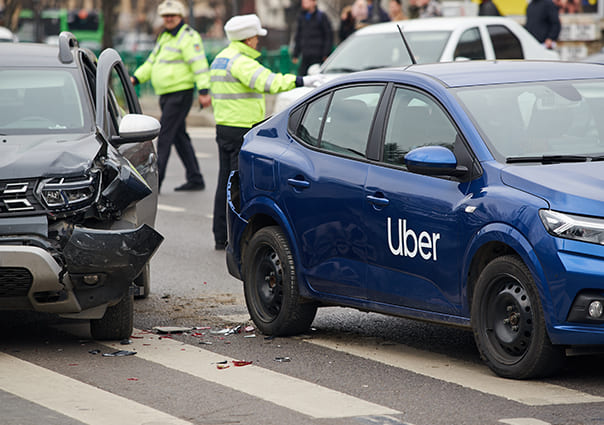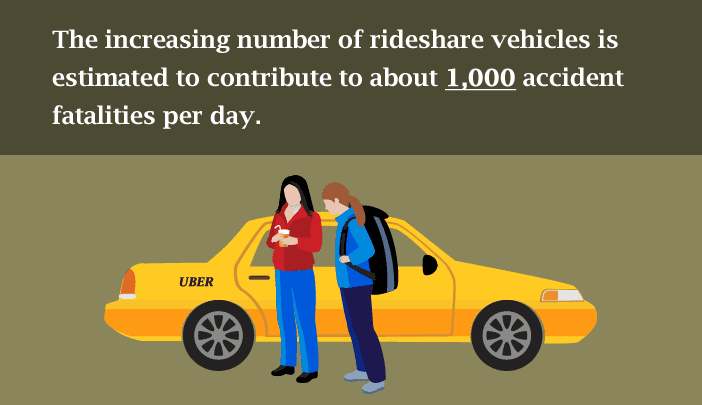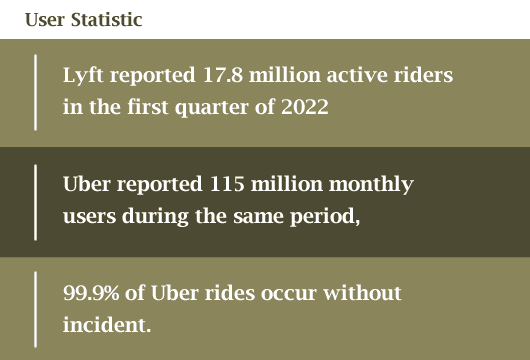Jump to the Uber & Lyft Accident Information You Need
- Expert Legal Support for Victims of Serious Uber & Lyft Accidents in Des Moines, IA
- Award Winning Recognition
- Additional Uber & Lyft Accident Resources
- Uber & Lyft Accident Statistics in Iowa
- Case Results
- Why You Need an Uber & Lyft Accident Attorney
- Understanding Liability and Legal Responsibilities in a Uber & Lyft Accident Scenario
- Active vs. Inactive Rideshare Driver
- What Are Your Rights as an Uber or Lyft Passenger?
- Contact Our Uber/Lyft Accident Attorneys
- Cases We Handle
- Contact Our Injury Lawyers
Legal Support for Victims of Serious Rideshare Accidents in Des Moines
Using a rideshare service such as Uber or Lyft has been increasingly popular in recent years. Since both services came to Iowa in 2016, riders and drivers have steadily increased. Many people utilize Uber and Lyft services on a regular basis.
Most of the time, you go from your home or start location to work or another destination without incident. However, situations beyond our control do occur from time to time. You may choose to file a lawsuit if you have been injured in an accident while using a rideshare service, either as a passenger or as another driver.
“Who is accountable for my injuries?” This is something that you may wonder if you are injured while traveling in an Uber or Lyft. Typically, the driver’s company will have insurance coverage that will reimburse you in the event of an accident if you experience any injuries. However, in certain circumstances, their insurance coverage cannot cover your damages. This may lead you to wonder who is liable.
It is imperative that you contact a skilled Des Moines car accident lawyer after suffering serious injuries in a car accident, especially when it involves a rideshare service. Mueller, Schmidt, Mulholland & Cooling can provide you with the legal advice you need to get the fair compensation you deserve. Our lawyers are ready to take on your case.
Get the Compensation You Deserve
Get Help NowProving Our Worth: Case Results
-
$1.3 million
Workers’ Compensation
Delivery driver assaulted by individual at a delivery location. Driver did not return to work from physical and mental injuries.
Read More -
$750,000
Workers’ Compensation
Delivery driver forced off road by passing truck. Injury to back resulting in back surgery.
Read More -
$250,000
Personal Injury
Mail delivery person struck by auto, resulting in neck and back injuries.
Read More
Honors and Recognition
Additional Uber & Lyft Accident Resources
Rideshare accidents can happen for many reasons, but they’re often due to driver negligence or unsafe road conditions. Some of the most common causes include:
- Distracted Driving: Rideshare drivers frequently check their phones for navigation and ride requests. This takes their attention off the road and increases the risk of accidents.
- Driver Fatigue: Many rideshare drivers work long hours or drive late at night, increasing the risk of drowsy driving. Drowsy driving is a significant risk factor for accidents.
- Speeding and Reckless Driving: Some drivers rush to complete more trips, leading to dangerous maneuvers and excessive speeds, which can make crashes more likely to occur.
- Poor Vehicle Maintenance: Rideshare vehicles are not always inspected regularly, leading to issues like faulty brakes or worn tires. When these components are worn or fail, serious accidents can occur.
- Traffic Violations: Running red lights, failing to yield, or making illegal turns can contribute to serious accidents.
These aren’t the only possible causes of rideshare accidents. Crashes can occur for any variety of reasons, and they’re not always obvious. The Des Moines rideshare accident lawyers at Mueller, Schmidt, Mulholland & Cooling can investigate your accident, find its causes, and hold the negligent party liable.
The impact of a rideshare accident can cause many different types of injuries. Common injuries sustained by passengers, drivers, and other road users in rideshare accidents include:
- Whiplash and Soft Tissue Injuries: The sudden and forceful impact of a rideshare accident can strain muscles, ligaments, and tendons, leading to pain and limited mobility in victims.
- Head Injuries and Traumatic Brain Injuries (TBIs): A blow to the head during a rideshare collision can result in concussions or more severe brain trauma.
- Broken Bones and Fractures: High-impact collisions often cause fractures in bones in the arms, legs, ribs, or hips.
- Spinal Cord and Back Injuries: Damage to the spine can lead to chronic pain, nerve damage, or even paralysis.
- Internal Organ Damage and Internal Bleeding: Severe crashes can cause life-threatening internal injuries that require immediate medical attention.
These injuries can have a devastating impact on your life both now and years into the future. However, rideshare companies and their insurers are often quick to assign these injuries to other causes or even claim they’re pre-existing. Our lawyers use medical records to definitively link rideshare accidents to the injuries our clients suffered to help them get the compensation they deserve.
If you’ve been injured in a rideshare accident, you may be entitled to significant compensation for your current and future expenses. Recoverable damages include:
- Medical Expenses: Covers hospital bills, surgeries, rehabilitation, prescription medications, and ongoing treatment.
- Lost Wages and Future Earning Capacity: Compensation for time missed from work and any long-term impact on your ability to earn a living.
- Pain and Suffering: Accounts for physical pain, emotional distress, and loss of enjoyment of life caused by the accident.
- Property Damage: Reimbursement for vehicle repairs or replacement if your car was involved in the crash.
- Punitive Damages: In cases of extreme negligence, additional compensation may be awarded to punish reckless behavior.
Unfortunately, getting compensation for a rideshare accident on your own can be difficult. That’s because rideshare companies are well-protected from both a legal and insurance standpoint.
And if your rideshare driver wasn’t at fault, the insurance company of the at-fault driver may still try to place the blame on them instead of their customer. This is why it’s important to have experienced legal help right away to determine who was at fault and hold them fully liable for your damages.
Why You Need a Rideshare Accident Attorney
In a ridesharing motor vehicle accident with an Uber or Lyft driver, determining culpability is the top priority after your safety is assured. A lawyer can assist you in locating the responsible party (or parties) and hold them accountable for your injuries and any other damages sustained. This can be challenging at times, and it often requires negotiations with many parties and insurance adjusters. Experienced personal injury lawyers will know what to do in the event of a ridesharing accident, as well as how to deal with the insurance companies.
If the rideshare driver is at fault, the passenger or other driver may be able to recover compensation from the driver’s personal insurance and/or the rideshare company’s liability policy.

If another driver is determined to be at fault, the injured party may be able to recover compensation from that driver’s personal insurance carrier.
In a rideshare accident, another important issue to evaluate is whether the driver had the ridesharing app open and running at the time of the crash. This can have a big impact on figuring out which insurance company is responsible for paying out. To aid the client in collecting fair compensation from all parties involved, an attorney will acquire all the necessary evidence to prepare a strong case.

Understanding Liability and Legal Responsibilities in a Rideshare Accident Scenario
In a rideshare accident, liability is established by who caused the collision. Liability establishes the “at-fault” person. Iowa is regarded to be a “fault” state. This means that if a motorist causes a car crash, their insurance will cover the costs of the other driver’s medical bills and all associated medical expenses from the car accident. As a result, victims who are found “not at fault” after a collision have the legal right to sue the other driver’s insurance company for personal injuries.
You are generally not at fault if you are injured as a passenger in a rideshare accident, and you have the right to hold liable parties accountable for your injuries and losses. Lawsuits could be filed against a variety of parties, including:
- The Uber, Lyft, or another rideshare driver
- Uber, Lyft, or another rideshare company
- Any other driver who was at fault for the accident
When passengers are inside a rideshare vehicle, rideshare providers must keep a minimum of $1 million in total liability coverage. If the driver is logged into the app but not transporting a passenger, they must have a minimum coverage of $50,000 per person and total liability coverage of $100,000 per accident. These policies also provide $25,000 in property damage coverage at a minimum.
In most cases, liability insurance policies forbid the use of automobiles for commercial purposes. As a result, innocent victims have significant difficulties in their recovery. Your attorney can help you receive compensation for the injuries you sustained by investigating alternative avenues of compensation.
Don’t let your accident become a burden. Let us fight for your rights and secure the compensation you deserve! Call Now:
(515) 316-3019Hear From Our Satisfied Clients: Real-Life Success Stories From Our Uber & Lyft Accident Cases
Uber & Lyft Accident Statistics in Iowa


The increasing number of rideshare vehicles is estimated to contribute to about 1,000 accident fatalities per day. For Uber passengers, the chance of dying in a fatal car accident is 1 in 90 million, while for Uber drivers, the chance is 1 in 140 million. In 2020, fatal car crashes, including those involving rideshare vehicles, saw a significant rise, attributed mainly to speeding and unsafe driving during the COVID-19 pandemic.
As for user statistics, Lyft reported 17.8 million active riders in the first quarter of 2022, and Uber reported 115 million monthly users during the same period, marking a substantial increase from the previous year. Despite these numbers, 99.9% of Uber rides occur without incident.
Diagram of the Legal Process for Car Accident Cases in Iowa

As you can see, the process typically begins with a consultation with an attorney, followed by an investigation of the accident and the gathering of evidence. The attorney will then negotiate with the insurance company on your behalf, and if a settlement cannot be reached, they may file a lawsuit. The case will then proceed to litigation, which may involve settlement negotiations, discovery, and possibly a trial.
Frequently Asked Questions
There are many ways you can handle insurance claims after an Uber or Lyft accident. This is why personal injury claims in a rideshare accident can become complicated. When an Uber or Lyft driver is working, there are three categories they are placed into, and these categories will become critical when you seek to receive compensation from your injuries:
- The app is turned on but has not accepted a ride.
- The app is on, the driver accepted a ride, and is on the way to pick up the person or group.
- The app is on, the rider is in the car, and the driver is taking the person to their destination.
A driver may also have their app turned off and be deemed inactive. In this situation, Uber and Lyft may not be liable for any damages the driver causes. Additionally, the driver is considered inactive when they have the app on but are not providing any service. In this situation, you will not be able to make a claim under Uber or Lyft’s insurance. Often, the driver’s personal insurance will not cover this either, unless the driver has added a policy for ridesharing to their coverage.
Under the second and third categories above, a driver is deemed “active,” and their collision and liability coverage will be in play. This is the best scenario for recovery, and you will be able to file a claim against either service’s insurance policies. However, you will still have to deal with the insurance adjusters and discuss a settlement.
The best way to receive fair compensation is to keep a log of the incident and all associated injuries. You should always seek medical attention after an accident to determine if there are any head or brain injuries, broken bones, dislocations, back and neck issues, or any other serious injury.
There are many ways you can handle insurance claims after a rideshare accident. This is why personal injury claims in a rideshare accident can become complicated. When a rideshare driver is working, there are three categories they are placed into, and these categories will become critical when you seek to receive compensation for your injuries:
- The app is turned on but has not accepted a ride.
- The app is on, the driver accepted a ride, and is on the way to pick up the person or group.
- The app is on, the rider is in the car, and the driver is taking the person to their destination.
A driver may also have their app turned off and be deemed inactive. In this situation, Uber and Lyft may not be liable for any damages the driver causes. Additionally, the driver is considered inactive when they have the app on but are not providing any service. In this situation, you will not be able to make a claim under Uber or Lyft’s insurance. Often, the driver’s personal insurance will not cover this either, unless the driver has added a policy for ridesharing to their coverage.
Under the second and third categories above, a driver is deemed “active,” and their collision and liability coverage will be in play. This is the best scenario for recovery, and you will be able to file a claim against either service’s insurance policies. However, you will still have to deal with the insurance adjusters and discuss a settlement.
The best way to receive fair compensation is to keep a log of the incident and all associated injuries. You should always seek medical attention after an accident to determine if there are any head or brain injuries, broken bones, dislocations, back and neck issues, or any other serious injury.
If you are a passenger in a ridesharing vehicle, the rideshare driver must be logged into their app to be covered by the company’s liability policy. Outside of this period, the only possible coverage is the liability insurance held by the vehicle’s driver.
It can be difficult to seek compensation as a passenger in a rideshare accident. It is critical that you understand your rights and have adequate insurance coverage.
In a ridesharing accident, there are four possible insurance companies against whom you can submit a claim:
- Uber or Lyft’s commercial car insurance policy
- The Uber or Lyft driver’s personal insurance
- A driver of a different car
- The injured passenger’s personal insurance
It may be difficult to choose which insurance provider to make a claim against. There are several factors that go into making a proper claim for compensation. In both Uber and Lyft’s apps, there’s an option to file a claim if you got in an accident during an active trip, or if it occurs while you’re on the app, but not on an active request, you can go under the help tab to file a claim within the app.
Iowa is a fault state when it comes to accident claims, which means the person determined to be at fault is responsible for all damages and injuries sustained in the accident.
If you have been in a car accident with a rideshare driver, there are many factors involved in deciding which insurance company and policy should cover the cost:
Rideshare driver caused the accident: The rideshare passenger or other driver can try to collect from the rideshare driver’s personal insurance or rideshare liability policy. Typically, the rideshare policy will have better coverage and provide you with more compensation for your injuries.
Was the rideshare application turned on? Was the rideshare application turned on but not in active use?
The rideshare insurance policy will only be active if the driver has the application turned on at the time of the accident.
If the application was not turned on, then the rideshare insurance will not cover the accident.
Another driver caused the accident: The personal insurance of that driver should pay out. This will be like any other car accident claim.
There are instances where a third party is involved in the accident and may bear some fault, or have no fault in the incident. Either way, it is necessary to get their information as well because you may be able to file a third-party claim and negotiate a settlement with their insurance company.
Don’t let your accident become a burden. Let us fight for your rights and secure the compensation you deserve! Call Now:
(515) 316-3019
Contact the Rideshare Accident Attorneys at Mueller, Schmidt, Mulholland & Cooling, PLLC
The personal injury attorneys at Mueller, Schmidt, Mulholland & Cooling can help you figure out who is responsible for your injuries and what steps you can take to help you financially and physically recover. One of the most important aspects of our task will be determining and identifying the cause of the rideshare accident. We will gather evidence to figure out who or what caused your accident so we get you the best outcome. Contact our Iowa rideshare accident attorneys today to obtain proper legal advice through a free consultation with one of our experienced attorneys.



















